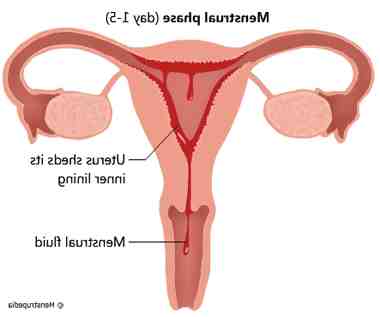Sommaire
What is the heaviest menstruation day?

The average period lasts from 2 to 7 days, with a heavier flow on the first two days. The answer to the question "how long does your period last?" therefore depends on the individual woman and her cycle. From one month to the next, it's perfectly normal to have a period for 3 days instead of 5.
When do periods last longer? Menstruation can sometimes last longer than usual. This is a sign that the mucous membrane inside the uterus has "grown" or proliferated more during this cycle. Of course, if you're bleeding a lot and it's recurring, you'll need to see a doctor.
Why are periods heavier at night?
Generally speaking, at night, you're lying down most of the time. This means that blood can't easily circulate by gravity, so it accumulates in the vagina before spilling out again. This can lead to leakage, as sudden bleeding may not be absorbed by your sanitary protection.
Why do my periods flow more at night?
At night, when we sleep, we lie down. Blood will therefore leave the body more slowly. As soon as we get up, we're upright and moving around. Blood flows more easily!
What increases the flow of rules?
They can have multiple causes: fibroids (benign (non-cancerous) tumors located on the wall of the uterus), adenomyosis (presence of endometrial tissue in the wall of the uterus), blood clot formation (ex.
What is the actual last day of menstruation?
The female cycle normally lasts 28 days. The cycle begins on the 1st day of menstruation and ends the day before the 1st day of the next menstruation.
What's the real day of the period?
Overview of the menstrual cycle The exact manifestation of a phase differs from woman to woman and can change over time. The first day of menstrual bleeding is considered Day 1 of the cycle. Your period may last between 3 and 8 days; the average duration is 5 days.
When does the menstrual cycle end?
The menstrual cycle lasts from the first day of menstruation to the first day of the next period. Its duration varies from 21 to 45 days, depending on the woman and her stage in life, with an average of 28 days.
When periods flow a lot?
A major cause of heavy periods is the presence of abnormalities (cysts, benign tumors, etc.) in the lining or mucosa of the uterus: polyps, adenomyosis, fibroids. Hormonal imbalance or lack of ovulation can also lead to heavy bleeding during menstruation.
How can you tell if you're losing too much blood during your period?
Menstruation is considered heavy if: the duration is more than 7 days. and/or the total amount is more than 80 ml per day (that is, about 5 full-size UPCs, or more than 5 super plus tampons, or more than 5 super plus sanitary napkins).
Is it normal to lose a lot of blood during your period?
Menstruation - or "period" - lasts an average of 2 to 7 days, depending on the woman. During this period, a healthy woman loses 40 to 50 ml of blood, equivalent to 8 to 10 teaspoons. Menorrhagia" occurs when periods are too heavy and/or last longer than 7 days.
Which fruits for menstruation?
Packed with vitamin B6, bananas are the fruit of choice during menstruation. It promotes the production of all the neurotransmitters associated with mood. Its high potassium content reduces muscle contraction and eases menstrual pain.
What juice should I drink when I'm on my period? Lemon juice can still have beneficial effects during menstruation. The vitamin C contained in lemons has a diuretic effect that helps combat water retention.
Which food helps relieve menstruation?
Choosing the right foods can also help relieve menstrual pain... 9 foods to eat to relieve menstrual cramps
- Dark chocolate. ...
- Peanut butter. ...
- Eggs. ...
- Green vegetables. ...
- Ginger. ...
- Pineapple. ...
- Bananas. ...
- Salmon.
When to worry about your period
A score of over 100 points corresponds to a volume of blood lost during menstruation of over 80 ml, and therefore to excessive menstruation (menorrhagia). You should then consult a doctor. If you notice any clots or spotting during your period, talk to your doctor too.
When should you worry about missing your period? If your menstrual cycle is generally regular, you may feel that your period is more than 5 days late. This means that if you're 1 to 5 days late, you can wait a while before you start to worry.
What are the reasons for menstrual disturbances?
Among the most common causes are puberty or menopause (the first and last cycles are often more abundant due to hormonal imbalance), and the presence of uterine polyps or fibroids, which tend to bleed.
How can menstrual disorders be treated?
In the event of hormonal imbalance, hormone treatments can help restore more regular periods. A progesterone deficiency, for example, can be compensated for by taking a progestin in the second half of the month. A hormonal IUD can also help prevent heavy periods caused by hormones.
What illness can block menstruation?
Ovarian tumours, polycystic ovary syndrome, damage to the uterus or vagina, hypo- or hyperthyroidism can also cause menstruation to stop. The use of certain medications, such as antidepressants, is also implicated.
Is it normal to lose blood clots during your period?
The presence of blood clots is therefore a normal phenomenon during menstruation, and nothing to worry about unless associated with other symptoms such as abdominal pain.
Why do I lose large blood clots?
Menstrual blood clots can be thick and lumpy or stringy. They form when blood accumulates in the uterus before exiting through the cervix or back of the vagina. Clots are also linked to fibroids - non-cancerous growths on the uterus (4).
Why do I lose lumps during my period?
Why do I get blood clots during my period? Blood clots are nothing more than coagulated blood that your body has not made more fluid. It's a phenomenon that happens very frequently and is normal, especially during periods of heavy menstruation or in the morning when the blood has stagnated overnight.
How to recognize bleeding periods
Menstruation is considered heavy if: the duration is more than 7 days. and/or the total amount is more than 80 ml per day (that is, about 5 full-size UPCs, or more than 5 super plus tampons, or more than 5 super plus sanitary napkins).
When are we talking about bleeding periods?
You may be considered to have a period if you have excessive blood loss (more than 90 ml), difficulty controlling the flow with conventional sanitary protection (tampons, pads), and/or if the duration of your period exceeds 7 days.
How do you know if you have a heavy flow?
A light flow is considered when the bleeding is less than 30 mL per cycle. Between 30 and 50 mL, it is called medium flow. Between 50 and 70 mL, it is called abundant flow. Above 70 mL, there will be a very abundant flow, even hemorrhagic.
Why are my periods heavier than usual?
While light periods are normal after the first period, in adult women they may be associated with illness or caused by environmental factors. If in doubt, consult your gynecologist.
When should you worry about your periods? An absence of periods for more than three months (amenorrhea) or a very irregular cycle, lasting from a few days to a few weeks, can give you cause for concern. These irregularities are sometimes the sign of an illness: thyroid problems, luteal insufficiency, obesity, hyperprolactinemia or polycystic ovaries.
Why is my menstrual cycle getting shorter?
Irregular menstrual cycles can occur for a variety of reasons, including pregnancy and breastfeeding, eating disorders, polycystic ovary syndrome, endometriosis, uterine fibroids, premature ovarian failure or pelvic inflammatory disease.
Why are my periods getting shorter?
In some cases, the ovaries may continue to secrete hormones irregularly for a few months before finally stopping, causing menstrual disorders with shortened cycles, heavy periods or the opposite.
Can the menstrual cycle change?
Some people experience irregularities such as periods that are more or less frequent than usual, or in some cases, no periods at all. Still others notice changes in menstrual flow, with more or less abundance during certain cycles.
What is a false rule?
False" periods, on the other hand, are not linked to ovulation, but simply to the intake of hormones, often as part of contraception or during the menopause. Basically, taking hormones suppresses ovulation and therefore the real menstruation.
What is an artificial period?
Artificial menstruation occurs when you experience bleeding induced by the contraceptive drug, which causes the onset of menstruation when you stop taking it. This is the classic contraceptive rhythm: three weeks of contraception, one week off and then you start again...".
How can you tell the difference between periods and bleeding?
Color. Implantation bleeding is very light, which translates into a pinkish or dark brown color, unlike the bright red of menstruation. Consistency. During your period, the bleeding may become thicker.
Why are periods heavier at night?
Generally speaking, at night, you're lying down most of the time. This means that blood can't easily circulate by gravity, so it accumulates in the vagina before spilling out again. This can lead to leakage, as sudden bleeding may not be absorbed by your sanitary protection.
Why do my periods flow more at night? At night, when we sleep, we lie down. As a result, blood leaves the body more slowly. As soon as we get up, we're up and moving around. Blood flows more easily!
When periods flow a lot?
A major cause of heavy periods is the presence of abnormalities (cysts, benign tumors, etc.) in the lining or mucosa of the uterus: polyps, adenomyosis, fibroids. Hormonal imbalance or lack of ovulation can also lead to heavy bleeding during menstruation.
What to do about heavy periods
Tips for your heavy periods
- Eat iron! Lentils will be your friend during this period. ...
- Choose menstrual pants in cotton or polyamide! ...
- Abuse the nettle! ...
- Use cold compresses. ...
- Supplement with magnesium. ...
- Think sage. ...
- Plant thyme. ...
- Adopt calendula.
How can you tell if you're losing too much blood during your period?
Menstruation is considered heavy if: the duration is more than 7 days. and/or the total amount is more than 80 ml per day (that is, about 5 full-size UPCs, or more than 5 super plus tampons, or more than 5 super plus sanitary napkins).
What increases the flow of rules?
They can have multiple causes: fibroids (benign (non-cancerous) tumors located on the wall of the uterus), adenomyosis (presence of endometrial tissue in the wall of the uterus), blood clot formation (ex.
How can I increase the flow of rules?
Tips for your heavy periods
- Eat iron! Lentils will be your friend during this period. ...
- Choose menstrual pants in cotton or polyamide! ...
- Abuse the nettle! ...
- Use cold compresses. ...
- Supplement with magnesium. ...
- Think sage. ...
- Plant thyme. ...
- Adopt calendula.
What can influence the rules?
An irregular cycle can be caused by a number of things. Firstly, it can be completely natural and linked to the hormonal fluctuations of adolescence or the menopause. It can also be linked to changes in lifestyle, such as travel, intense physical activity or weight variations.
